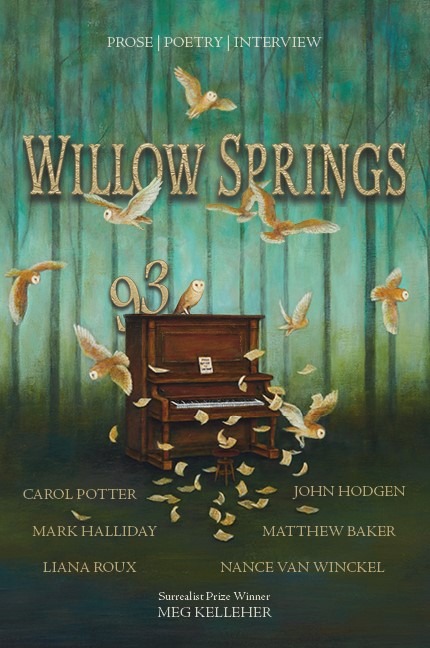
About Meg Kelleher
Meg Kelleher is an English Literature Ph.D. dropout and licensed clinical social worker who specializes in creativity and trauma. Her work has been published in The Shore, The Broadkill Review, and elsewhere, and she was Fellow for Kaveh Akbar at StoryBoard 2021 and a 2022 Bread Loaf Writers’ Conference Contributor. She is currently at work on a novel and a book of nonfiction, and she lives in her birthplace of Chicago. You can find her on Instagram.
A Profile of the Author
Notes on “Nokomis Groves”
“Nokomis Groves” is named after a defunct citrus operation in Sarasota County, the coastal Florida community where I lived from age 7 to 21. After beginning this poem years ago, some shadowy subliminal force drove me to finally complete and submit it to the contest at the last minute. It’s been a dream to win.
Music, Food, Booze, Tattoos, Kittens, etc.
I should have expected the news that Nokomis Groves is being converted into a gated housing development of single family homes. I should have expected that the orange trees would be torn out, the ones that scented the winters of my childhood with their dissolute blossoms. This is a place where prehistoric shark teeth litter the beaches, antediluvian monsters prowl waterways, and over-55 restricted retirement communities spread like exotic creepers, strangling more fragile life.
I should have known. As a child in Florida, I learned to fit myself into the preexisting order and accept the absolute dominion of the old regime. The fact that it grows relentlessly, ever proliferating in conch-white high rise complexes and eel-blue swimming pools, does not make it any less the old regime.
Yet it’s easy to take for granted that a home is yours and always will be.
After my father retired from the Chicago police in the 1980’s, we moved to Sarasota, where he worked as a sheriff’s deputy. For years he was assigned to oversee evictions, reporting to rental properties on the precise day that tenants’ time had run out. My father said that he never had to force anyone to go, that he’d just knock on the tenants’ doors in his uniform and they would step away from their homes willingly—albeit in some disbelief, a sort of daze. They’d frequently leave behind their televisions and stereos and abandon boxes of clothes and records on the lawn.
That was my father’s day job. But the seat of his true vocation lay in our garage, where he fixed things in his off time. No car, computer or appliance repair was beyond his ken. Sometimes he’d rehabilitate the broken things the tenants had left behind.
After my father retired for good, my parents developed an unconventional streak counter to the currents of more common snowbirds. They sold our home in Sarasota and moved near me in Chicago, where I’d previously relocated. My mother retired shortly before the pandemic began and increasingly devoted herself to caring for my father.
But a few months ago my mother admitted that my father’s needs now exceeded her capacity. She placed him in the secure memory unit of an assisted living facility near us both in the Chicago suburbs.
The facility is called Saratoga Grove. We slip up and call it Sarasota Grove all the time. Just before we moved my father into the facility, I traveled to Sicily, to the Kolymbethra Gardens in Agrigento. Between the ruins of Greek and Roman temples, near a quarry that served as a prison for the slaves who spent their lives carving out limestone for their captors, there are citrus groves. Today the 2,500 year-old aqueduct system still flows, and ancient varieties of oranges and other fruits are irrigated in the classical Arab tradition.
The staff at Saratoga Grove reassure us that they want to help my father be comfortable but not to “snow” him—in other words, not to use unnecessary sedation. They want him to remain as much himself as he can be—still funny, charming, amiable—for as long as he can be.
But sometimes my father wriggles out of the electronic monitoring bands on his wrist and ankle, hacks the elevator keypad code, and watches for the perfect moment to run for it. He attempts to arrest the staff who try to curtail his escape and keep him from returning home. He’s made it as far as the parking lot.
Does “home” for my father refer to Florida, or to Chicago? Based on my experience, I’d say it just means not here.
.


